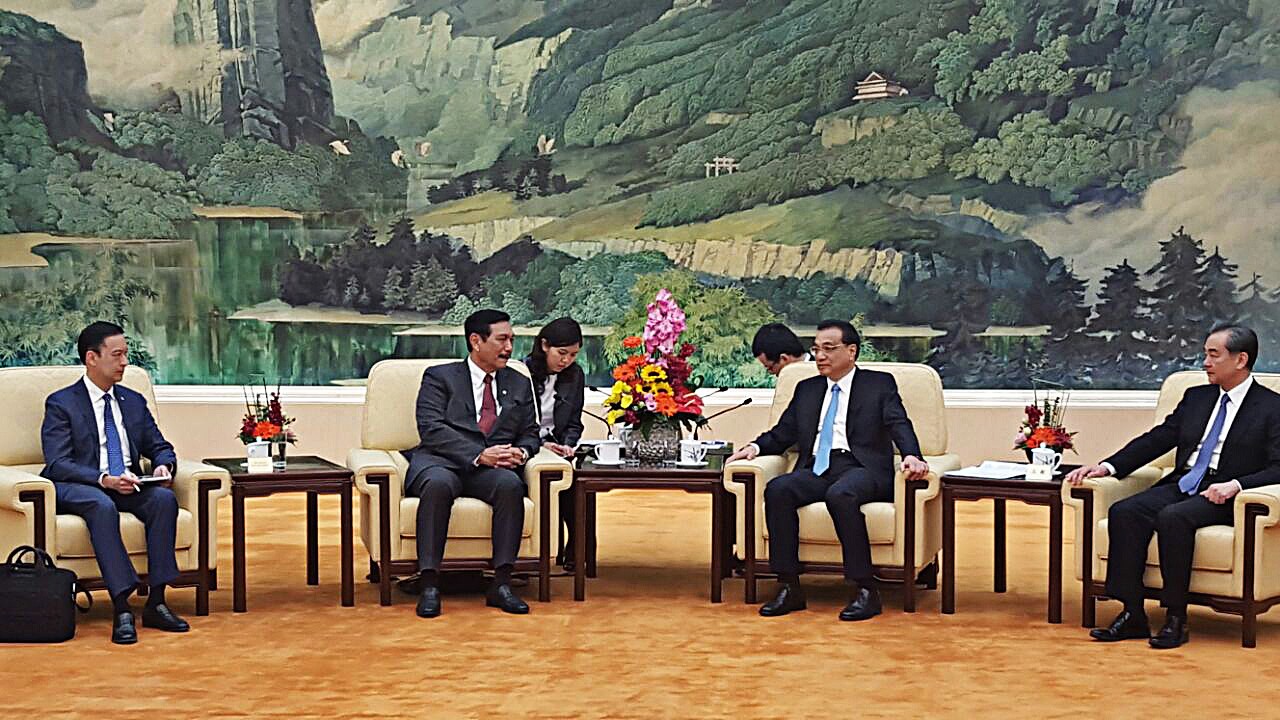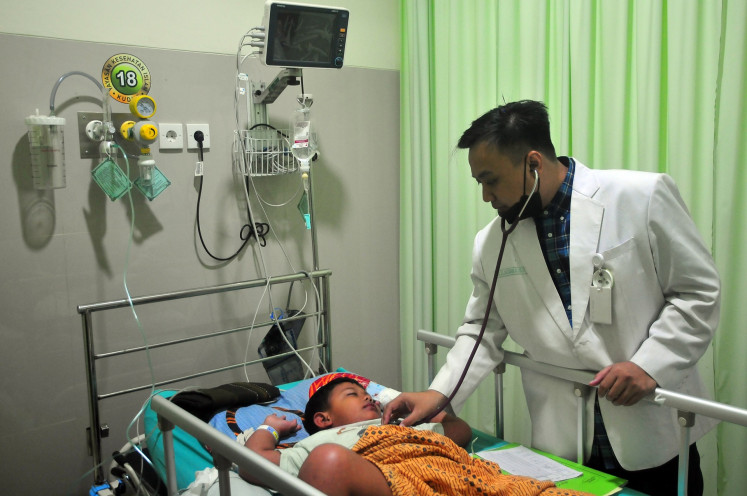Popular Reads
Top Results
Can't find what you're looking for?
View all search resultsPopular Reads
Top Results
Can't find what you're looking for?
View all search resultsBelt and Road benefits Indonesia, the world
To achieve national rejuvenation of China and Indonesia, President Xi and President Joko “Jokowi” Widodo have reached the important consensus on promoting synergy between China’s Belt and Road Initiative (BRI) and Indonesia’s “Global Maritime Fulcrum” Vision.
Change text size
Gift Premium Articles
to Anyone
 Closer ties: Coordinating Maritime Affairs Minister Luhut Binsar Pandjaitan (second left) discusses with China Prime Minister Li Keqiang (second right) on the sidelines of the Belt and Road Trade and Investment Forum in Beijing, China, on April 12. (Courtesy of the Coordinating Maritime Affairs Ministry/File)
Closer ties: Coordinating Maritime Affairs Minister Luhut Binsar Pandjaitan (second left) discusses with China Prime Minister Li Keqiang (second right) on the sidelines of the Belt and Road Trade and Investment Forum in Beijing, China, on April 12. (Courtesy of the Coordinating Maritime Affairs Ministry/File)
I
t was here in Indonesia in 2013 that the 21st Century Maritime Silk Road Initiative was first proposed by Chinese President Xi Jinping during his state visit to Indonesia. To achieve national rejuvenation of China and Indonesia, President Xi and President Joko “Jokowi” Widodo have reached the important consensus on promoting synergy between China’s Belt and Road Initiative (BRI) and Indonesia’s “Global Maritime Fulcrum” Vision.
Since then, China-Indonesia relations have entered the fast track of development for mutual benefit and win-win results.
Southeast Asia’s first high speed rail, the Jakarta-Bandung high-speed rail is the signature project of the first phase of synergizing strategies.
Construction has begun on over 50 work sites including several bridges and tunnels. The tunnel boring machine has been installed and commissioned. Concrete-pouring of the first box beam was completed.
We hope the Jakarta-Bandung high-speed rail will be completed at an early date. By then, the 3 to 5 hour or more commuting time by car between the two cities will be shortened to under 40 minutes, which will form an economic corridor along the route.
During Premier Li Keqiang’s visit to Indonesia last May, the two governments signed a memorandum of understanding on Regional Comprehensive Economic Corridors, the signature project of the second phase of synergizing development strategies between China and Indonesia. A few days ago, the first meeting of the Corridors’ joint steering committee was held in Bali. This project will greatly stimulate growth in the outlying islands and reinvigorate alignment of development strategies.
The positive trend of China-Indonesia cooperation is the epitome of China’s BRI cooperation. More and more countries have aligned their respective strategies with the BRI which unleashed cooperation potentials and generated new drivers for the global economy. The BRI principle of joint consultation and collaboration for shared benefits has been incorporated into the outcome documents of major international mechanisms including the United Nations.
To date, over 140 countries and international organizations have signed BRI agreements with China. Trade between China and the BRI partner countries has exceeded US$6 trillion. The more than $80 billion of Chinese investment in these countries has created over 240,000 local jobs.
Apart from being a grand vision for cooperation, the BRI also aims to improve people’s livelihoods, enabling ordinary families and people to realize their dreams.
There is a young woman from Surabaya, who works for the Jakarta-Bandung High-speed Rail project, after graduating from the Engineering Department of Yellow River Conservancy Technical Institute, Henan province, in 2016. She joined the project as a translator and now has become a white-collar employee. Three months after joining the company, she bought her mother a car, her dream since childhood. Now, her biggest dream is that one day the high-speed rail would not only be completed at a early date, but also extended to her hometown in Surabaya.
Within the past five years, the Qingshan Morowali Industrial Park in Sulawesi has reached the annual production target of 3 million tons of stainless steel, making Indonesia the world’s second-largest stainless steel producer. A 27-year-old local young man became a crane driver in the industrial park after months of training. His monthly salary has risen to Rp 8 million ($564.08).
More than 28,000 local employees work in the park, and the number keeps growing.
Another example is Huawei. Starting with only five employees in 2000, Huawei Indonesia now has over 2,500 staff, and locals make up 87 percent of the workforce. The company indirectly generates more than 20,000 jobs each year.
In 2017, Huawei launched the Smart Generation Program in collaboration with eight Indonesian universities to share the latest technologies and applications.
It has provided internships and job opportunities for over 3,000 outstanding local university students. In 2018, in response to President Jokowi’s call for developing vocational education, Huawei provided free information and communications technology training for thousands of students from 12 local vocational schools, to help Indonesia cultivate its own engineers. Huawei has invited more than 100 Indonesian students to study communications in China.
If we look back at the past five years of BRI cooperation and ask what it has brought to Indonesia, I believe the above stories have answered the question. It has stimulated investment and cooperation, created opportunities and dreams, advanced growth and progress, and brought hope and aspiration. Nonetheless, people still criticize China for disregarding other countries’ liabilities and solvency when issuing loans, and adding to the debt of some countries, in an attempt to gain control over projects. Such accusation is groundless.
China always sticks to an economic benefit-oriented approach, extending loans based on the real conditions of the relevant countries, supporting project construction and avoiding creating more debt risks or increasing fiscal burdens of the host countries.
To ensure sustainable financing, 27 countries, including China, have formulated the “Guiding Principles on Financing the Development of the Belt and Road”, which aims to foster a transparent, friendly, non-discriminatory and foreseeable financing environment with equal consideration to debt sustainability, to ensure steady and sustained progress in building the BRI.
Regions along the BRI have long faced significant financing gaps, the chronic bottleneck restricting regional development.
According to the Asian Development Bank, by 2030, Asia will need $1.7 trillion infrastructure investment per year. Currently, it can receive over $800 billion annually, only filling half the gap.
The African Development Bank also reported Africa will need up to $170 billion worth of infrastructure investment each year. Yet, the current annual investment meets barely one third of the demand. The BRI projects bring effective investment, valuable assets and much-needed development funds to the relevant countries, and help promote local economic growth and improve livelihoods.
As President Xi remarked, “the BRI may be China’s idea, but its opportunities and outcomes are going to benefit the world; China has no geopolitical calculations, seeks no exclusionary blocs and imposes no business deals on others”.
Over the past five years, reality shows no attachment of political strings to BRI cooperation or any attempt to seek selfish political gains. Instead, the BRI is committed to further improve global supply, value and industry chains by strengthening connectivity.
Mounting protectionism and unilateralism particularly hurts the growth environment of developing countries. The BRI cooperation thus plays an increasingly positive role.
China stands ready to work with all countries including Indonesia with joint consultation and collaboration for shared benefits, further synergize development strategies, and jointly contribute to development and lasting prosperity of the region and beyond. This month, Beijing is to host the second Belt and Road Forum for International Cooperation. We look forward to more fruitful results that will deliver more opportunities and benefits to Indonesia and other countries and regions along the BRI.
***
The writer is China’s Ambassador to Indonesia.









